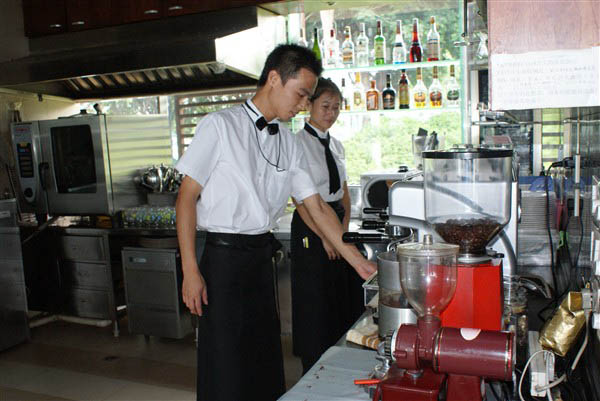Barista Professional Standard Barista Professional Skills Advanced Barista Coffee Industry Barista Elements

According to the relevant provisions of the Labor Law of the people's Republic of China, combined with the current social and economic situation of our country, as well as the future development trend, in order to further improve the national vocational qualification standard system, to provide a scientific and standardized basis for vocational education, vocational training and vocational skills identification, the National Barista Professional Committee of the Business skills Identification and Catering Service Development Center organized relevant experts. The "Professional Standard for baristas" (hereinafter referred to as "Standard") has been formulated.
Barista professional certification will implement the national unified examination outline, unified proposition, unified organization of the examination method. The examination is divided into two parts: theoretical knowledge examination and professional skills examination. The theoretical knowledge examination shall be conducted with a unified question bank and random test papers, and the professional skills will be examined through professional software for on-the-spot demonstration examination. Those who pass the examination are assessed and certified by the National barista Professional qualification Evaluation Committee, and the barista professional qualification certificate is issued by the Business skills Appraisal and Catering Service Development Center.
The professional qualification certificate of barista is valid all over the country, which is not only an important basis for the holder to hold the post, but also an important reference for the employer to assess the qualification ability of the holder. The certificate adopts a registration system and is inquired at the National baristas Professional Committee National Business Professional qualification Network (www.ncc.org.cn) of the Business skills Identification and Catering Service Development Center.
According to the relevant provisions, this Standard divides the profession into three levels, including occupational profile, basic requirements, job requirements and specific gravity table.
Career profile
1. 1 occupation name
Barista
1. 2 occupation definition
Refers to employees engaged in work related to the coffee industry, including coffee professionals and service personnel.
1. 3 occupation level
The profession is divided into three levels: assistant baristas, baristas and senior baristas.
1. 4 professional environment
Cafes, clubs, high-end clubs, places of leisure and entertainment, etc.
1. 5 characteristics of professional ability
Have the ability and basic quality of coffee making.
1. 6 training requirements
1. 6.1 training unit
With the approval of the National barista Professional Committee and the relevant institutions with the qualifications for running a school or training prescribed by the state, the relevant institutions shall carry out pre-examination training and pre-examination guidance for this professional qualification. The teaching materials and syllabus must be selected by the National Committee of baristas.
1. 6.2 training of teachers
Teachers who train assistant baristas should have relevant professional and technical qualifications at intermediate level or above, have certain practical ability and rich teaching experience, and obtain the qualification of "registered barista trainer". Teachers who train baristas and senior baristas should have relevant professional and senior professional and technical qualifications, have more than ten years of teaching experience in this field, and obtain the qualification of "barista registered senior trainer".
1. 6.3 duration of training
No less than 40 standard hours for assistant baristas, no less than 60 standard hours for baristas, and no less than 80 standard hours for senior baristas.
1. 6.4 training venue equipment
Standard classrooms and practical training venues with related facilities that can meet the requirements of the demonstration.
1. 7 identification requirements
1. 7.1 Adaptive object
A person who is engaged in or is prepared to engage in his or her profession.
1. 7.2 Application conditions (those who meet one of the following conditions)
Assistant barista
① high school degree or above, engaged in coffee making for more than 1 year, qualified after formal training as an assistant barista
② has been engaged in coffee making for more than 2 years and has been formally trained by assistant baristas to meet the standard class hours.
Barista (person who meets one of the following conditions)
① college degree or above, engaged in coffee making for more than 1 year, qualified by formal training of baristas
② technical secondary school degree or above, major in food, hotel management, etc., engaged in coffee making for more than 2 years, non-above major, must have more than 3 years of practical experience in related industry
③ has been engaged in coffee making for more than 3 years and has been trained by baristas to meet the standard class hours.
Senior barista (one who meets one of the following conditions)
① college degree or above, engaged in coffee making for more than 2 years, reached the standard after formal training of senior baristas
② technical secondary school degree, graduated from food, hotel management and other related majors, engaged in coffee making for more than 2 years, not the above major, must have more than 3 years of practical experience in related industries
③ has been engaged in coffee making for more than 5 years and has been trained by baristas to meet the standard class hours.
1. 7.3 Identification method
It is divided into theoretical knowledge examination, thesis defense and professional skill examination. The examination of theoretical knowledge is in the form of closed papers, the defense of the thesis is reviewed by experts on the spot, and the examination of professional skills is carried out according to the needs of all levels of skills. Assistant baristas implement the method of theoretical knowledge examination and evaluation, baristas implement the method of theoretical knowledge examination plus thesis defense, and senior baristas implement the method of theoretical knowledge examination plus professional skill examination. determine whether to pass the application level according to the results of the theoretical knowledge examination and the results of professional skills evaluation.
1. 7.4 ratio of examinees to examinees
The ratio of examinees and examinees in the theoretical knowledge examination shall be 1:20, with not less than 2 examiners in each standard classroom and no less than 5 members on the comprehensive evaluation committee. The ratio of examinees to examinees in professional skills assessment is 3RU / M / L
1. 7.5 Identification time
The examination time of theoretical knowledge is 120 minutes and the examination time of skill operation is 60 minutes.
1. 7.6 Identification sites and equipment
At present, the theoretical knowledge examination is conducted in the standard classroom, the classroom must be equipped with relevant equipment, and the paper review is conducted in the designated place.
Important Notice :
前街咖啡 FrontStreet Coffee has moved to new addredd:
FrontStreet Coffee Address: 315,Donghua East Road,GuangZhou
Tel:020 38364473
- Prev

The brewing method of coffee the characteristics of brewing coffee.
In the brewing of coffee, it is not said which is the best way; everyone has what they think is the best way to make coffee. Coffee is already a part of our daily life, so it must suit our way of life; it can also meet the economic benefits of each person. Making coffee is not only a ritual, but also a practical problem in our lives. Coffee is not like tea or
- Next

What is authentic? Cappuccino coffee encounters "identity crisis" cappuccino espresso
According to an article published in the US media on the 9th, cappuccino is a coffee drink loved by coffee fans. But now the former king of specialty coffee drinks is suffering from an identity crisis. Once upon a time, cappuccino was very easy to identify, the article said. An espresso with hot milk, topped with protein frost. But for now, what exactly is cappuccino?
Related
- Beginners will see the "Coffee pull flower" guide!
- What is the difference between ice blog purified milk and ordinary milk coffee?
- Why is the Philippines the largest producer of crops in Liberia?
- For coffee extraction, should the fine powder be retained?
- How does extracted espresso fill pressed powder? How much strength does it take to press the powder?
- How to make jasmine cold extract coffee? Is the jasmine + latte good?
- Will this little toy really make the coffee taste better? How does Lily Drip affect coffee extraction?
- Will the action of slapping the filter cup also affect coffee extraction?
- What's the difference between powder-to-water ratio and powder-to-liquid ratio?
- What is the Ethiopian local species? What does it have to do with Heirloom native species?

